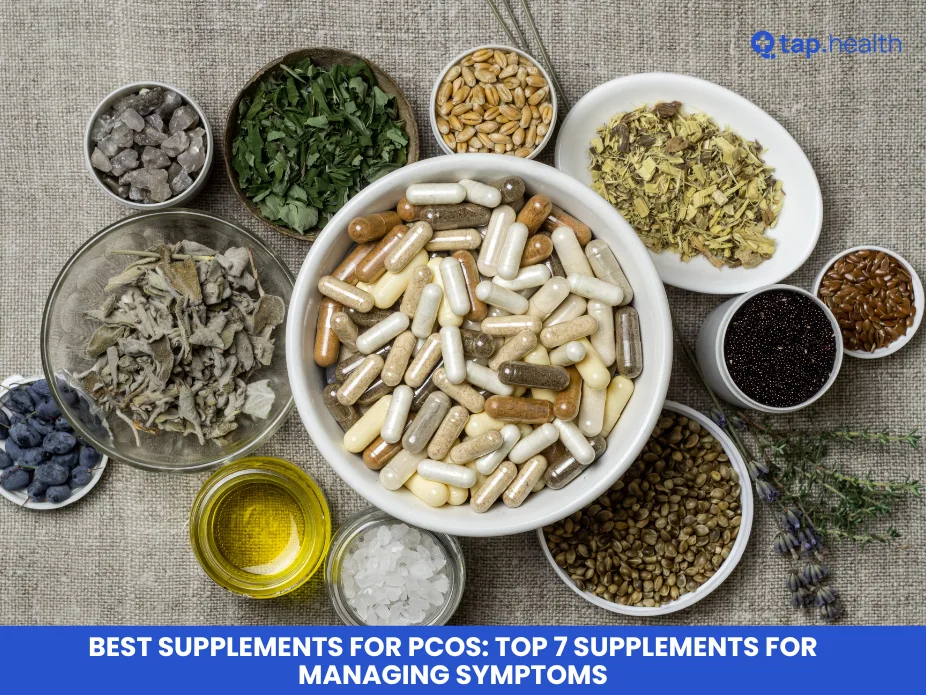Polycystic Ovary Syndrome (PCOS) is a common hormonal condition affecting women worldwide. It can lead to a range of frustrating symptoms, such as irregular periods, acne, excessive hair growth, and weight gain. Although there is no “one-size-fits-all” treatment, lifestyle changes—including diet and exercise—can go a long way in managing PCOS. For many women, supplements have become an essential part of their PCOS management plan.
In this article, we’ll dive into the best supplements for PCOS that have shown promise in research and in real-world usage. We’ll also provide insights into how these supplements work and how they can help improve symptoms like insulin resistance, inflammation, and hormonal imbalance.
1. Inositol (Myoinositol and D-Chiro Inositol)
What is Inositol?
Inositol is a type of sugar that plays a crucial role in cellular processes, including the regulation of insulin. It exists in several forms, two of the most popular being myoinositol and D-chiro inositol. In women with PCOS, these forms of inositol are known to help improve insulin sensitivity, balance hormones, and regulate menstrual cycles.
How Does Inositol Help with PCOS?
- Insulin Sensitivity: Many women with PCOS experience insulin resistance, where the body becomes less sensitive to insulin, causing elevated blood sugar and promoting fat storage. Inositol supplementation can improve the body’s response to insulin, helping to regulate blood sugar levels and prevent complications such as type 2 diabetes.
- Menstrual Regularity: Inositol has been shown to help women with PCOS achieve more regular menstrual cycles, which can be a significant benefit for those trying to conceive.
- Fertility: By improving insulin sensitivity and hormone regulation, inositol has been shown to support fertility, making it a popular supplement for women with PCOS trying to conceive.
Evidence
Several studies have found that inositol, particularly the combination of myoinositol and D-chiro inositol, can significantly improve PCOS symptoms, such as menstrual irregularities, insulin resistance, and ovulation. For example, a review published in Gynecological Endocrinology found that inositol supplementation significantly improved ovulatory function in women with PCOS.
2. Vitamin D
Why Vitamin D Matters for PCOS
Vitamin D is a fat-soluble vitamin that plays a critical role in immune function, bone health, and hormone regulation. Many women with PCOS are found to have low levels of vitamin D, which can exacerbate insulin resistance, inflammation, and even increase the risk of metabolic disorders.
How Does Vitamin D Help with PCOS?
- Insulin Sensitivity: Adequate levels of vitamin D help improve insulin sensitivity. Research suggests that women with PCOS and low vitamin D levels have a higher degree of insulin resistance, which can worsen symptoms such as weight gain and irregular periods.
- Hormone Balance: Vitamin D has a role in regulating sex hormones, including estrogen and progesterone. Low levels of vitamin D have been associated with an imbalance of these hormones, contributing to the symptoms of PCOS.
- Fertility: Correcting vitamin D deficiency may also improve fertility, especially in women with PCOS who struggle to conceive.
Evidence
A study published in The Journal of Clinical Endocrinology & Metabolism found that vitamin D supplementation significantly improved insulin resistance in women with PCOS. Moreover, women with adequate vitamin D levels were more likely to have regular menstrual cycles.
3. Omega-3 Fatty Acids
What Are Omega-3 Fatty Acids?
Omega-3 fatty acids are essential fats that the body cannot produce on its own, so they must be obtained through diet or supplementation. These healthy fats are primarily found in fatty fish like salmon, as well as in plant-based sources like flaxseeds and walnuts.
How Do Omega-3 Fatty Acids Help with PCOS?
- Reduce Inflammation: Women with PCOS often experience low-grade inflammation, which can exacerbate insulin resistance and other metabolic issues. Omega-3s have anti-inflammatory properties that can help reduce this inflammation.
- Insulin Sensitivity: Omega-3s may help improve insulin sensitivity, which is beneficial for managing weight and preventing the development of type 2 diabetes.
- Hormone Regulation: Omega-3 fatty acids may help balance hormones and support the reproductive system. For women with PCOS, improving hormone balance can help regulate menstrual cycles and reduce symptoms like acne and excessive hair growth.
Evidence
A systematic review published in Reproductive Health showed that omega-3 supplementation could reduce inflammation, lower testosterone levels, and improve insulin resistance in women with PCOS. Additionally, studies suggest omega-3s may also support mood and mental well-being, which can be helpful for managing the stress often associated with PCOS.
4. N-Acetyl Cysteine (NAC)
What is N-Acetyl Cysteine?
N-Acetyl Cysteine (NAC) is a supplement form of cysteine, an amino acid that helps the body produce the antioxidant glutathione. NAC has been used for a variety of health conditions, including PCOS.
How Does NAC Help with PCOS?
- Improves Insulin Sensitivity: NAC has been shown to help reduce insulin resistance, one of the major issues faced by women with PCOS.
- Supports Fertility: NAC can improve ovulatory function and increase the chances of conception, especially in women with PCOS who struggle with fertility.
- Reduces Androgen Levels: High levels of androgens (male hormones) in women with PCOS can lead to symptoms like excessive hair growth and acne. NAC has been found to help lower these levels and reduce these symptoms.
Evidence
A study published in Human Reproduction showed that NAC improved ovulation and increased pregnancy rates in women with PCOS, especially those who had trouble ovulating. Another study found that NAC supplementation resulted in significant improvements in insulin resistance and blood sugar levels.
5. Zinc
Why Zinc is Important for PCOS
Zinc is an essential mineral that plays a role in immune function, skin health, and hormone regulation. It is often used to help manage acne and improve fertility in women with PCOS.
How Does Zinc Help with PCOS?
- Acne and Skin Health: Zinc is known for its ability to improve acne, a common symptom of PCOS caused by hormonal imbalances.
- Hormonal Balance: Zinc plays a crucial role in hormone regulation, including the regulation of androgens (male hormones), which are often elevated in women with PCOS.
- Immune Function: Zinc also helps support a healthy immune system, which is important for women with PCOS who often experience chronic inflammation.
Evidence
A study published in The Journal of Dermatology showed that zinc supplementation helped reduce acne in women with PCOS. Additionally, research has shown that zinc can lower testosterone levels, improving symptoms like excess facial hair growth.
6. Magnesium
What is Magnesium?
Magnesium is a vital mineral involved in hundreds of biological processes, including muscle function, nerve function, and energy production. Many women with PCOS have low magnesium levels, which can exacerbate symptoms like insulin resistance and weight gain.
How Does Magnesium Help with PCOS?
- Improves Insulin Sensitivity: Magnesium has been shown to help improve insulin sensitivity, making it a useful supplement for women with PCOS who struggle with blood sugar control.
- Reduces Symptoms of Anxiety and Depression: Magnesium has calming effects on the nervous system and can help alleviate symptoms of anxiety and depression, which are common among women with PCOS.
- Supports Heart Health: Magnesium is essential for cardiovascular health, and improving magnesium levels may help protect against the increased risk of heart disease in women with PCOS.
Evidence
A study in The Journal of Clinical Endocrinology & Metabolism showed that magnesium supplementation improved insulin resistance in women with PCOS. Magnesium also helps regulate cortisol levels, which can be helpful for managing stress-induced PCOS symptoms.
7. Berberine
What is Berberine?
Berberine is a plant-derived compound found in several herbs like goldenseal and barberry. It has been used in traditional medicine for centuries for its antimicrobial and anti-inflammatory properties.
How Does Berberine Help with PCOS?
- Improves Insulin Sensitivity: Berberine has been shown to significantly improve insulin sensitivity and lower blood sugar levels, making it a potential supplement for managing the metabolic aspects of PCOS.
- Promotes Healthy Weight: Berberine may help with weight loss by regulating blood sugar and improving fat metabolism.
- Regulates Menstrual Cycles: Some studies suggest that berberine can help regulate menstrual cycles in women with PCOS.
Evidence
A clinical trial published in The Journal of Clinical Endocrinology & Metabolism showed that berberine supplementation improved insulin sensitivity and helped with weight management in women with PCOS. Another study found that berberine was effective in reducing testosterone levels and improving menstrual regularity.
Read this – Can a Gluten-Free Diet Help Manage PCOS?
Real-Life Scenarios
Many women with PCOS have explored dietary changes and supplements to manage their symptoms. For example:
- Sarah’s Experience: Sarah, a 28-year-old woman with PCOS, noticed that incorporating inositol and vitamin D supplements into her routine seemed to improve her menstrual regularity and energy levels. She also adopted a balanced diet and regular exercise regimen, which contributed to her overall well-being.
- Emily’s Journey: Emily, 35, struggled with weight gain and insulin resistance. She began taking omega-3 fatty acids and magnesium supplements, along with dietary changes, and experienced improved blood sugar control and weight management.
These anecdotes highlight that while supplements can be beneficial, they are most effective when combined with a healthy lifestyle.
Expert Contributions
Dr. Olivia Farrow, a registered dietitian, notes that while supplements can aid in managing PCOS symptoms, they should complement a balanced diet and regular exercise. She emphasizes the importance of consulting with a healthcare provider before starting any new supplement regimen to ensure safety and efficacy. Allara Health
Recommendations Grounded in Proven Research and Facts
Based on current research, here are some dietary recommendations for managing PCOS:
- Focus on Whole Grains: Whole grains like quinoa, brown rice, and oats are rich in fiber and can help regulate blood sugar levels.
- Incorporate Lean Proteins: Foods such as chicken, turkey, tofu, and legumes provide essential amino acids and support muscle mass.
- Include Healthy Fats: Avocados, nuts, and olive oil contain healthy fats that support hormone production and reduce inflammation.
- Limit Processed Foods and Sugars: Reducing intake of refined carbohydrates and sugary snacks can help manage insulin resistance.
- Stay Hydrated: Drinking plenty of water aids digestion and helps maintain overall health.
- Regular Physical Activity: Combining a balanced diet with regular exercise can improve insulin sensitivity and support weight management.
- Consult Healthcare Professionals: Before making significant dietary changes or starting supplements, it’s important to consult with a healthcare provider or registered dietitian to create a personalized plan.
Factual and Reliable Information
It’s crucial to approach dietary changes and supplementation with caution. While certain supplements may help manage PCOS symptoms, they are most effective when combined with a healthy lifestyle. Always consult with a healthcare provider before starting any new supplement regimen to ensure safety and efficacy.
Conclusion: Which Supplements Should You Choose for PCOS?
Managing PCOS is about more than just taking supplements; it’s about adopting a holistic approach that includes diet, exercise, and lifestyle changes. However, the supplements listed above have shown promising benefits for addressing the hormonal imbalances and metabolic challenges that come with PCOS. Before adding any of these supplements to your regimen, it’s important to consult with your healthcare provider to ensure they are right for you.
FAQs on Best Supplements for PCos:
1. How long does it take for supplements to work for PCOS?
The effects of supplements like inositol, vitamin D, and omega-3 fatty acids can take a few weeks to a few months to show noticeable improvements, depending on the individual and the severity of symptoms.
2. Can supplements completely cure PCOS?
No, supplements alone cannot cure PCOS. They can help manage symptoms and improve overall health, but lifestyle changes, including diet and exercise, are also essential.
3. Is it safe to take multiple supplements for PCOS?
While many women take a combination of supplements for PCOS, it’s important to consult your doctor before combining supplements to avoid potential interactions.
4. What is the best supplement for insulin resistance in PCOS?
Inositol (especially the combination of myoinositol and D-chiro inositol) and berberine are two of the best supplements for improving insulin sensitivity in women with PCOS.
5. Can zinc help with PCOS acne?
Yes, zinc has been shown to help reduce acne, a common symptom of PCOS, by regulating testosterone levels and supporting skin health.



